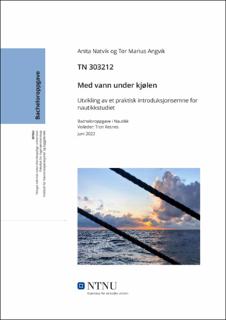| dc.contributor.advisor | Resnes, Tron | |
| dc.contributor.author | Natvik, Anita | |
| dc.contributor.author | Angvik, Tor Marius | |
| dc.date.accessioned | 2022-07-19T17:22:32Z | |
| dc.date.available | 2022-07-19T17:22:32Z | |
| dc.date.issued | 2022 | |
| dc.identifier | no.ntnu:inspera:114859670:114861192 | |
| dc.identifier.uri | https://hdl.handle.net/11250/3007033 | |
| dc.description.abstract | Med utgangspunkt i funn gjennom periodisk evaluering av BSc nautikk ved NTNU, hvor det kom fram at både studenter og næringen ønsker økt bruk av praktisk undervisning, undersøker denne oppgaven muligheten for å innføre et praktisk introduksjonsemne i studieplanen. Hensikten er å gi studentene på nautikkstudiet en praktisk forståelse av studiets innhold, herunder skipets oppbygging, komponenter og daglige gjøremål.
Teorigrunnlaget for oppgaven er hentet gjennom litteraturstudie og presenterer hvordan bruken av praktisk læring og aktiv refleksjon kan skape økt læringsutbytte, høyere forståelse og bedret læringsfellesskap. Videre er det gjennomført et feltstudie om bord seilskipet Christian Radich, med intervjuer av deltakere underveis og i etterkant av tokt.
Arbeidet har resultert i et forslag til hvordan et praktisk introduksjonsemne kan gjennomføres om bord Christian Radich. Det presenteres forslag til læringsaktiviteter, praktisk gjennomføring og antatt utbytte. Et slikt introduksjonsemne vil ta for seg oppgaver som vil bidra til økt forståelse, læring og mestring for studentene. Deltakelse i oppgaver knyttet til navigasjon, drift av skip og dets systemer gir studentene oversikt over hva utdannelsen videre vil tilby og det skaper holdepunkter studentene kan knytte den senere teoretiske læringen opp mot. Gjennomføring av et tokt i begynnelsen av studiet vil gi studentene ekstra erfaring og motivasjon de kan ta med seg videre i studiet. Det vil også danne et sosialt grunnlag med felles kultur som legger grunnlaget for utviklingen av klassemiljøet og læringsfellesskapet.
Kostnaden på et tokt med Christian Radich er kr 100.000,- pr døgn. Ved å legge opp til en seilas på ti dager vil studentene få oppleve hvordan arbeidsdager til sjøs er med vaktordninger, og samtidig ha tid til å ta for seg andre praktiske oppgaver knyttet opp mot STCW-konvensjonen og kommende teoretiske emner. Emnet bør finansieres av NTNU da det antas at raskere etablering av klassemiljø kan hindre frafall av studenter, noe som gir økt statsstøtte og legger grunnlag for at toktet selvfinansieres. Sender man ut forelesere sammen med studentene vil det bidra til sterkere relasjoner mellom forelesere og studenter, samtidig som det legitimerer forelesers nautiske rolle som formidler i senere undervisningssammenheng.
Konklusjonen presenterer forslag til emnebeskrivelse, hvilke oppgaver studentene kan delta i om bord, læringsutbytte, toktets påvirkning på videre studier og hvilke avklaringer som må gjøres før emnet kan implementeres i studieplanen. Oppsummert viser oppgaven at et slikt tokt vil være gunstig for klassemiljøet, videre læring og motivasjon gjennom studiet. | |
| dc.description.abstract | Based on the periodical evaluation of BSc Nautical Studies at NTNU, where findings show that both students and the maritime industry wishes for there to be more use of practical learning, this thesis investigates the opportunity of implementing a practical introduction course into the curriculum. The purpose is to give the students a practical understanding of the degree’s content including a ship’s structure, components, and daily tasks.
The theory for the thesis was gathered through literature review and presents how the use of practical learning and active reflection can increase learning outcome, understanding and improve the learning environment. A field study has been conducted on board sailing vessel Christian Radich with interviews of participants during and after the voyage.
The work has resulted in a proposition of how a practical introduction course can be conducted on board Christian Radich. Suggestions for learning activities, practical facilitation and assumed outcome is presented. The course will include activities that lead to higher understanding, learning and mastery among the students. By participating in tasks linked to navigation as well as management of the ship and its systems, the students will attain an overview of what the education entails as well as give them practical experiences they can link the coming theoretical subjects and requirements in the STCW-convention to. Implementation of the course at the beginning of the education will give the students experience and motivation for further studies. It will also form a common culture and function as a foundation for the social environment within the class.
The cost of hiring Christian Radich is NOK 100.000,- pr day. During a ten-day voyage students will be able to experience how the workdays at sea are structured through shifts all the while participating in practical tasks. NTNU should finance the course as it is assumed that a faster establishment of the social environment in the class can keep students from leaving the program, increasing the governmental funding received, thus making the course self-financed. Sending faculty along on the course contributes to stronger relationships between faculty and students, as well as legitimise the nautical role of the faculty as a lecturer.
The conclusion presents a disposition for a course description, what tasks the students may participate in on board, learning outcomes, the course’s influence on other subjects as well as which practical challenges need to be addressed. The thesis aims to prove that a voyage such as this will be favourable for the class environment, coming learning and motivation throughout the program. | |
| dc.language | nob | |
| dc.publisher | NTNU | |
| dc.title | Med vann under kjølen - utvikling av et praktisk introduksjonsemne for nautikkstudiet | |
| dc.type | Bachelor thesis | |
